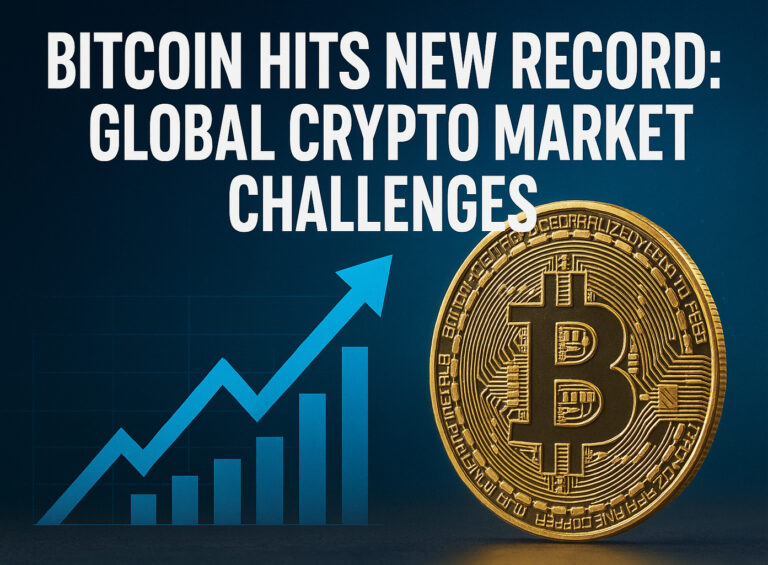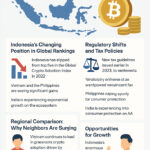Premium Biz Post – Bitcoin has once again made headlines by reaching an unprecedented price milestone, attracting both seasoned investors and curious newcomers to the cryptocurrency landscape. As the world’s largest digital currency by market capitalization, Bitcoin’s price surge highlights its growing influence in global finance and underscores the global crypto market challenges shaping this era of digital transformation.

The Historic Price Surge
The recent price rally has positioned Bitcoin at a record high, exceeding expectations set by analysts and industry leaders. Factors contributing to this surge include increased institutional adoption, rising interest from retail investors, and a perception of Bitcoin as a hedge against inflation. In addition, geopolitical tensions and economic uncertainty have led many to explore cryptocurrency as an alternative investment, further fueling its momentum.
Unlike traditional assets such as gold or fiat currencies, Bitcoin’s decentralized nature allows it to thrive in environments where trust in centralized institutions wavers. Over the last decade, Bitcoin has evolved from a niche asset embraced by tech enthusiasts to a globally recognized financial instrument. Its latest price increase is a testament to growing trust in blockchain technology and its transformative potential.
Institutional Involvement and Regulatory Shifts
A key driver of Bitcoin’s price surge is the unprecedented level of institutional involvement. Major companies, investment funds, and publicly traded corporations have started adding Bitcoin to their portfolios, viewing it as a long-term store of value. The approval of Bitcoin exchange-traded funds (ETFs) in various markets has also made investing in digital assets more accessible to traditional investors.
At the same time, governments and regulatory bodies worldwide are tightening cryptocurrency regulations. While regulation provides a safety net against scams and fraudulent schemes, excessive oversight could stifle innovation. This creates a delicate balance between protecting consumers and fostering growth in the digital asset industry. As Bitcoin achieves mainstream recognition, nations are grappling with how best to regulate without discouraging innovation or driving investment to less regulated jurisdictions.
Bitcoin’s Role in Diversified Portfolios
Bitcoin’s growing reputation as “digital gold” has made it a popular asset for portfolio diversification. Unlike equities, commodities, or fiat currencies, Bitcoin offers a decentralized option that’s resistant to inflationary pressures. Financial advisors increasingly recommend small allocations of Bitcoin to hedge against economic uncertainty.
Yet, with opportunity comes risk. Bitcoin remains a highly volatile asset. Rapid price fluctuations can lead to significant gains or losses in a short time frame. This volatility is both a blessing and a curse, attracting investors seeking high returns while scaring away conservative participants.
Challenges in the Global Crypto Market
As Bitcoin hits record highs, the entire cryptocurrency ecosystem faces several challenges:
- Regulatory Ambiguity:
The lack of standardized global regulations makes it difficult for companies to operate across borders. While some countries embrace crypto innovation, others impose strict restrictions, creating a fragmented global market. - Security and Fraud Risks:
Despite advancements in blockchain security, cryptocurrency exchanges and wallets remain targets for hackers. Phishing attacks, rug pulls, and other scams are frequent threats in the crypto space. - Environmental Concerns:
Bitcoin mining consumes significant energy, sparking debates about sustainability. Efforts to integrate renewable energy into mining operations are growing but remain uneven across regions. - Market Volatility:
Crypto’s volatility discourages mainstream adoption for daily transactions. Bitcoin is widely used as an investment, but fewer people use it as a medium of exchange. - Education Gaps:
Many potential investors still lack knowledge about cryptocurrencies, leading to skepticism and slower adoption. This knowledge gap creates opportunities for education initiatives to build confidence in digital finance.
Read More : ”DIY Cleaning Ideas: A Clean Home with Natural Ingredients”
Adoption Trends Across the Globe
The surge in Bitcoin’s value reflects more than just investor interest; it signifies global adoption trends. In developing countries, Bitcoin is increasingly used to combat inflation and access financial services unavailable through traditional banking. Meanwhile, developed nations see Bitcoin as a lucrative investment opportunity and a symbol of financial independence.
Latin America, Africa, and parts of Southeast Asia are becoming hotbeds for cryptocurrency adoption. Countries facing economic instability and high inflation rates turn to Bitcoin as a reliable store of value, often facilitated by mobile apps and peer-to-peer exchanges.
In contrast, Western markets are dominated by institutional investment, ETFs, and corporate involvement. The interplay between these two adoption trends—grassroots usage in emerging economies and institutional adoption in developed nations—creates a unique dynamic in the global crypto market.
Technological Advancements Driving Growth
Bitcoin’s ecosystem is continuously evolving, with technological upgrades helping improve scalability, transaction speed, and security. The Lightning Network, for example, enables faster and cheaper Bitcoin transactions, making it more viable for everyday payments.
Moreover, innovations in blockchain infrastructure, decentralized finance (DeFi), and tokenization are driving broader market growth. Developers are experimenting with ways to integrate Bitcoin into the larger decentralized ecosystem, making it a more versatile asset.
Opportunities for Investors
For long-term investors, Bitcoin’s recent price surge reinforces its role as a hedge against inflation and currency devaluation. Institutional support, growing regulatory clarity, and technological advancements present compelling reasons to include Bitcoin in diversified portfolios.
However, experts advise caution. The crypto market’s unpredictability makes research and risk management essential. Diversification across asset classes, secure storage practices, and staying informed about regulatory changes are crucial steps for anyone entering the cryptocurrency space.
Global Crypto Market Challenges and the Road Ahead
The global crypto market challenges facing Bitcoin and other cryptocurrencies are a natural part of innovation in a rapidly evolving financial system. Regulation, environmental concerns, and volatility are hurdles that need addressing, but they also signify that crypto has entered the mainstream conversation.
Analysts predict that Bitcoin’s role will continue to grow as institutional adoption expands and more countries explore central bank digital currencies (CBDCs). These government-backed digital assets could reshape global finance, complementing or competing with decentralized cryptocurrencies.
In the coming years, Bitcoin is likely to solidify its position as a cornerstone of digital finance, bridging the gap between traditional systems and decentralized innovations. Investors, businesses, and governments alike must navigate these challenges with caution, but those who adapt stand to benefit from this historic transformation in global finance.
Bitcoin’s new record is more than just a price milestone; it’s a reflection of shifting economic paradigms and growing trust in decentralized technology. The digital currency’s meteoric rise showcases the potential of blockchain to redefine financial systems worldwide, but it also underscores the pressing need for thoughtful regulation, education, and innovation.



